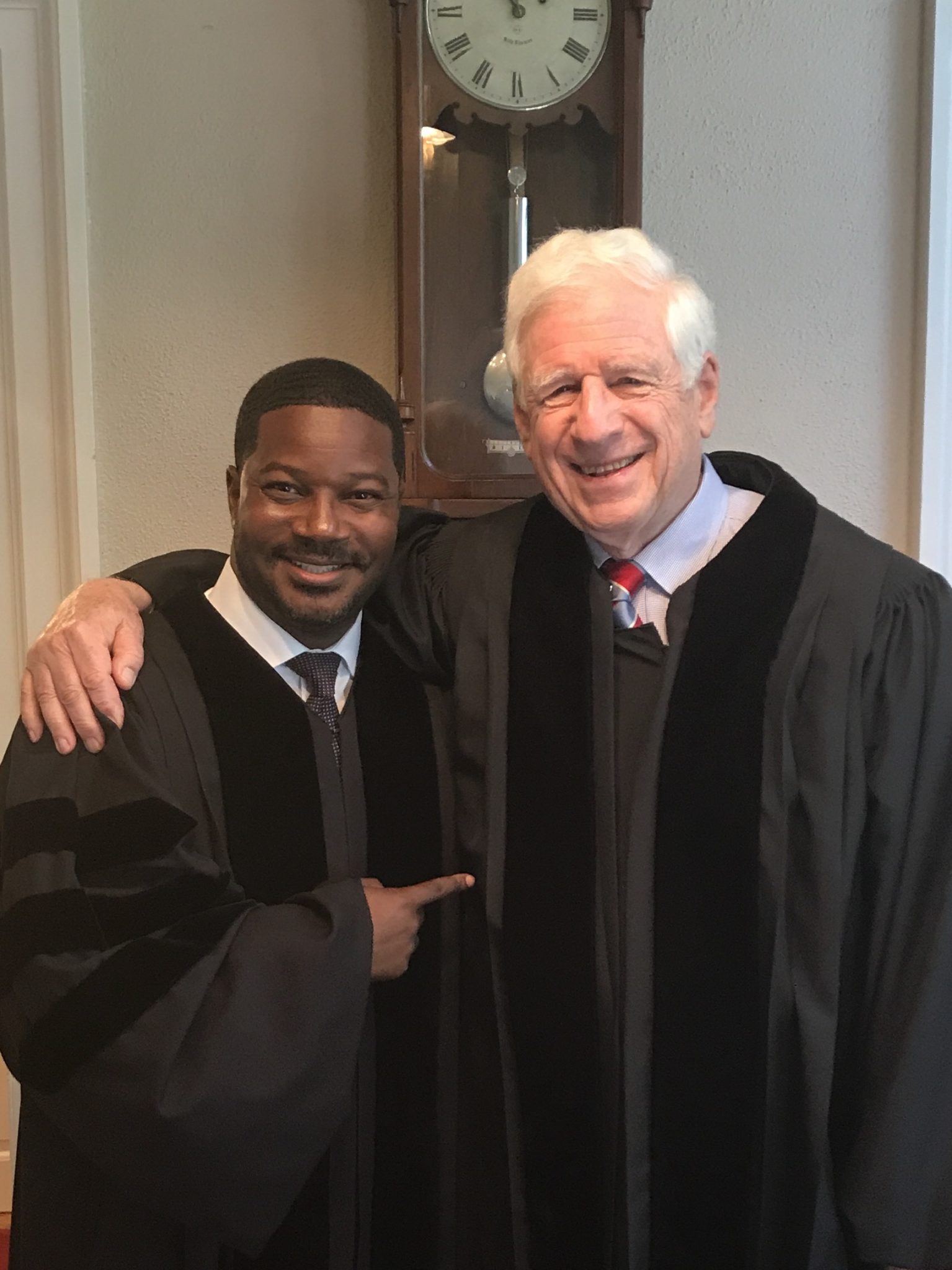Sermon delivered by Danforth at Harvard Memorial Church: “Parables, Priorities, and Politics”


Jonathan Walton, Plummer Professor of Christian Morals and Pusey Minister in the Memorial Church, welcomes John Danforth, former U.S. Senator from Missouri and ordained Episcopal priest, to Harvard University’s Memorial Church in Cambridge, Massachusetts, where Danforth delivered a sermon on Sunday, September 24, 2017.
PARABLES, PRIORITIES AND POLITICS
Again, the kingdom of heaven is like a merchant in search of fine pearls; on finding one pearl of great value, he went and sold all that he had and bought it.
Matthew 13:45-46
This morning, I’d like to speak to you about politics. I’ll not argue for a party or candidate. That wouldn’t be appropriate. I’d like us to think more about tone, about the overall state of politics. And I’d like us to consider how we as religious people might make politics better.
All of us know that something has gone terribly wrong. Congress is in gridlock, unable to resolve differences. Even worse is the psychological effect politics is having on us citizens. Recently, a friend told me that he can’t stop thinking about it, and it’s making him extremely depressed. I suspect he has a lot of company.
I spent a career in elective politics, eight years as my state’s attorney general and three terms in the U.S. Senate. I am an Episcopal priest, and I believe that our religious faith can help mend what is so obviously broken.
I invite you to think with me about the gifts religion can bring that would make politics more workable and less psychologically damaging. The gifts I have in mind are particular to religion. They aren’t readily available from any other source.
The gift suggested by today’s Gospel reading is perspective. Religion gives us perspective. It puts first things first, and it helps us put everything else in its proper place. My contention is that in politics, we have lost our perspective. We have blown politics way out of proportion, and the excessive weight we have given it is at the root of our current problem.
Certainly, politics is important and worth doing well. But when we lose perspective, it becomes dysfunctional and destructive.
Perspective, putting life’s concerns in their proper place, is a religious theme. In today’s Gospel reading we find it in the parable of the pearl of great price.
Parables teach us about the kingdom of Heaven. When we think of the kingdom of Heaven, we might think of the world to come, and it’s certainly that. But the parables are written in the present tense. They teach us what the kingdom is like here and now as well as in the next life.
Some parables tell us how God works in the kingdom. The kingdom is like a tiny mustard seed that God grows to the size of a mighty tree. Others tell of what God expects of you and me because we are citizens of the kingdom. The parable about perspective says that we should be like a merchant who sells all to buy the pearl of great price.
The merchant in the story has much in his inventory, a lot of fine pearls. He likely spent years collecting them. He values them, as do his customers. There’s a market for them, willing buyers and a willing seller. But there’s only one pearl of great price, a single treasure that is more precious than his entire stock. Everything else that he owns is relative in value to that single pearl.
It’s a metaphor. In the kingdom there is only one pearl of great price, or as we say in the Nicene Creed, one God. Everything else is relative in value to that one pearl. Citizens of the kingdom keep everything else in its proper place. They have a sense of perspective.
The importance of perspective isn’t unique to one parable. Harvard’s great theologian, Paul Tillich, described religion in terms of ultimate concern. Each of us has many concerns, but only one concern can be ultimate.
The Second Commandment is about perspective. It says, “You shall not make for yourself an idol.” Much of the Hebrew Bible condemns idolatry. What does this mean today? You and I don’t worship golden calves. We don’t make idols out of precious metal. But in our own ways, we make idols every day, because an idol is whatever takes the place of God as our ultimate concern. Some popular idols are money and possessions and status. In recent times, we have added politics to the pantheon. In the past couple of decades we have raised politics to a position it doesn’t deserve. It has become too much, too preemptive of our attention, our energy, our emotional balance. Here’s a story about my own culpability.
Years ago, I was on the verge of losing reelection to the Senate. It turned out OK, but I was terribly upset at the time. I had a mental image of thousands of people setting alarm clocks so they could rush to the polls and vote against me. I had no sense of perspective. It was as though the meaning of my life depended on keeping my job. Sensing my anguish my then 15 year old daughter did her best to comfort me. She said, “Well Dad, it’s not the World Series.”
That was long ago, and the story is about just one threatened politician. Now loss of perspective has spread to the general population. Here’s the evidence:
Exhibit A: The cost of campaigns. This year a special election for one seat in the U.S. House of Representatives cost more than $50 million. That was for one of 435 seats in one of the two houses of Congress. Much has been said about campaign finance reform.
The Supreme Court has left little room for doing that. But we must ask ourselves a broader question about what we value. Clearly our values are upside down when one House seat costs $50 million.
Exhibit B: The duration of campaigns. They, like the divine, are infinite. One election ends and the next one begins. It was the case that people were elected to serve. Now they are elected to start work on the next election.
Exhibit C: The media’s exaggeration of politics. It swamps us. Multiple internet and radio sites are exclusively politics, and 24 hour news channels are little else. The smallest nugget is breathtaking: “Breaking News!” The media doesn’t enlighten us. It whips us into a frenzy.
Exhibit D: Absolutism. Absolutists on left and right demand dogmatic purity from their followers, and turn politics into religion. The Armageddon-like quality of the health care debate is a recent example. The word from the true believers is “Don’t compromise, don’t give an inch.” If you dare to compromise, a new verb will be brought into play. You will be primaried.
But the only way politics can work is through compromise. That’s how the framers of our Constitution designed it to be. Competing interests would be balanced against others so that all sides would be heard, but few would be completely satisfied.
Now, polar opposites insist on total satisfaction. Politics is no longer the art of compromise, it’s the tactic of appeasing the base. The result is that government isn’t serving its intended function as a place to address our differences; rather, it’s a forum for making non-negotiable demands.
Perhaps worse than making government dysfunctional, our lack of perspective has undermined our lives together as families and neighbors. Witness Thanksgiving dinners after the last election. There’s no room for love when politics is more than mere opinion, when your brother or sister isn’t simply wrong, but evil. Consider these examples of what overblown politics has done to us:
· My first example is a personal experience that seems trivial, but is a sign of our times. In my church, we exchange the peace. It’s a nice little interlude for treating strangers as friends. You turn to people around you, extend your hand or offer a hug and say, “The peace of the Lord,” or simply, “Peace.” In style and content, it is the opposite of a Sunday morning talk show. Two weeks ago a normally gentle soul used the occasion of the peace to hector me about what she thought was wrong about my party. Politics had worked its way into the liturgy.
· A second example: An opinion poll reported that after the last election, one third of college students “unfriended” someone because the erstwhile friend had voted for the wrong candidate.
· Another example: Sixty percent of parents who identify as Democrats or Republicans say that they wouldn’t want their children to marry someone in the other party. It seems that politics is no longer allowed to make strange bedfellows.
· A final example: Consider the coarseness of our culture and the breakdown of civility. Check out social media. Surely, the state of politics contributes to this. Every election year, we say we are disgusted. We ask why campaigns are so offensive, so out of bounds. The answer is that such campaigns work. They win elections.
If politics is our highest good, anything goes, however crude, to serve its purpose.
*****
The pearl of great price teaches that in God’s kingdom perspective is essential. In recent times, we have lost perspective. We have exalted politics to a preeminence it doesn’t deserve. The results have been dire for workable government, for our life together as family and neighbors, and for our culture. How, then, can we as religious people make politics better?
We have a special gift to offer, a healing message for America that’s ours alone to give.
It’s about perspective and it flows directly from the first article of the Nicene Creed.
We believe in one God, and our one God is certainly not politics. Politics is important, but we cannot allow it to be our ultimate concern. Because politics isn’t ultimate, we can insist that compromise is more than acceptable, it is essential for government to work.
Because there is one God, there must be limits to what can serve the ends of politics. Dostoevsky said, “Without God, all things are permitted.” That is where we are today in politics. Without God, anything goes in politics, however crude. With God, all things are not permitted, and we should say so.
Our faith teaches that we must love the Lord our God with all our heart, mind and soul, and we must love our neighbor as ourselves. That’s love of God and neighbor, not love of party and ideology.
The pearl of great price is a lesson about perspective. Politics isn’t religion. It isn’t even the World Series.

